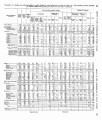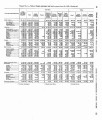| OCR Text |
Show adequate to deal with the situation satisfactorily. In a great many there is little reason for recognizing "Indian custom " to defeat the maintenance of well-recognized law and order. The majority of the worst offenders are not the red old or ignorant Indians, but the younger classes, who know better, but who also how that the lays are inadequate to punish them. By the act of June 2, 1924, all Indians who were not already citi-zens are made such, and it is believed that wlth few exceptions they should be made subject to the penal laws applicable to all other citi-zens. Sections 328 and 329 of the Federal penal code should be enlarged to provide for most cases of crime or offenses committed by Indians within Indian reservations. S ~ ~ E ~ SOF I LOIQUONR mm~c.-WhiIe the appropriation has been decreased again for the current fiscal year, and operations will therefore necessarily be curtailed, good results have been secured. In addition to the law violators actuall caught and prosecuted, the activities of the officers have prevente i many Indians from being made the victims of those who are criminal enough to debauch them. Much assistance and cooperation is secured from the officers of the Federal Prohibition Director's force, United States marshals and deputies, etc., and from many State officers, such as sheriffs and their deputies city police, etc. The problem of keeping intoxicating liquors from Indians is still acute, however, and the work is exceed-ingl hard and hazardous,, two of our comparatively small force hav-ing leen shot to death durlng the year by criminals engaged in viola-tion of the liquor laws. PEYOTE.-Reports continue to come in relative to the evil *flu-ences of peyote and the crafty schemes of those promoting its sale and use. A Federal law is needed to rohibit or curb its use and sale. Bills heretofore.introduced have Ailed of passage. MARRUQEA ND DI~o~c~.-IndianSar e more and more adoptia the general practice of civilization in marryin in accordance wit the 'i; f laws of the State in which they reside. T e old form of <'Indian-custom marriage " is not so frequently utilized by Indians whodesire to assume the relationship of husband and wlfe, and +here such relationship was entered into by Indiah custom they are usually willing to conform to the State law upon request of the superintend: ent. There are some who, not desiring to take up the marriage rela-tionship in good faith,fall back on the "Indian-custom marriage " and " Indian-custom divorce " to protect them in their licentiousness. On most of the Indian reservations at least i t is believed that the. Indians are sufficiently well advanced to justify an act of Congress requiring Indians to comply with the State laws iwthe matter of marriage and divorce. Such law, of conrse, would not be retroactivej but would provide for legal procedure-after the date:fixedby the.act. PENSIOOF NI NDIsAcoN~~ s.-ManyqldI ndian warriors who ren-dered faithful service to Uncle Sam in the years gone by have beet1 rewarded by the granting of pension.s'to asslst them in meeting their needs in their old age.. At the same time it is toberegtetted.,bhat others who have lost their discharges and are wiabke~tog ive the name by which they were enrolled :in the Army have been unsble; there-fore, to secure their pension. 'A technical constrtiction of.law:pre-. . . , . . . , . . / ' : '. |



































































